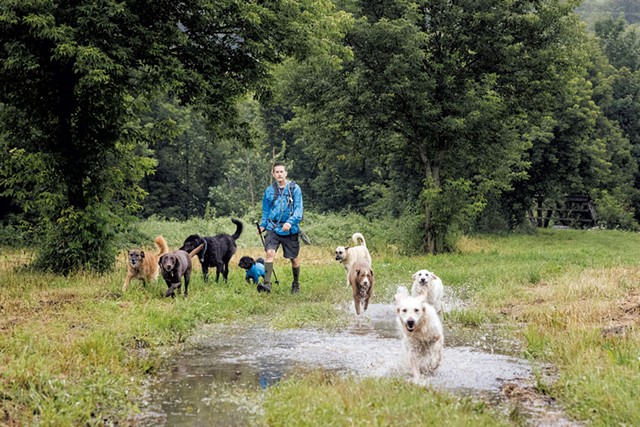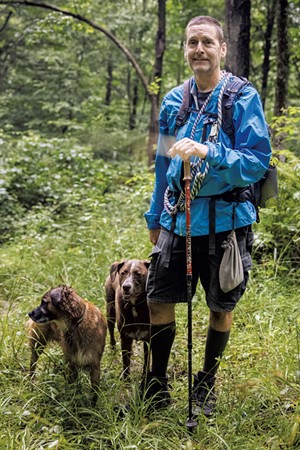
- Oliver Parini
- JR Miller
On Wednesday mornings, my husband, Tom O'Connor, and I know not to say the day of the week out loud. We don't dare even whisper the name "JR." Then, 10 minutes before JR Miller is due to arrive at our home, we take out the blue body suit that Lenny, our dog, wears in the summer on hikes to deter burrs and ticks — and the frenzy begins.
Lenny is our 5-year-old, 20-pound rescue dog: part poodle, part many other breeds and 100 percent enthusiastic. When he sees JR, his tail spins like an analog clock gone wild, and his body shakes in fevered excitement. Wednesday is off-leash pack-walk day, when Lenny will go on an outdoor adventure with Miller and as many as 13 other canines, and he simply can't wait.
Miller owns Burlington-based Green Bandana Dogs, which offers training and supervised off-leash pack walks for dogs. His business, which serves clients in Burlington, South Burlington and Shelburne, is one of more than two dozen in at least six counties around Vermont that provide such services, often called "dog camps."
Dog camps are opportunities for dogs to walk, run, swim, play with other dogs — and sniff to their heart's content — for a few hours in an outdoor environment with no fences and plenty of freedom.
Trained human leaders take out five to 14 dogs at a time, and their service includes pet pickup and drop-off at clients' homes or workplaces. Some dogs attend every day; others, certain days of the week. Fees run from $35 to $45 for a half day.
For Izzy, a 60-pound Labrador retriever and German shepherd mix, Tuesday is the magic day.
"It's Izzy's best day of the week," said Emily Piccirillo of Burlington. She and her husband, Gordon Clark, can't utter "JR" until they see a text from Miller saying he'll arrive in three minutes. Izzy squeaks and whines, sounds she only makes during that wait time, until she hears Miller's truck, looks out the window and starts to tremble.
"Izzy is like a teenage girl at a rock concert, leaning against the stage," Piccirillo said. "It's as if JR [were] Elvis. If Izzy wore panties, she'd be throwing them on the stage."
What is it about dog camps that turn dogs into groupies?
Owners cite outside exercise without a leash, socialization with other dogs and dogs' improved health.
Karen Sokol of Burlington sent 90-pound Harry, who is part Griffon, to Miller's camp — until the family adopted Poppy, a 60-pound mixed breed. Then she sent both dogs once a week. Eventually, the pair attended camp daily.
When Sokol recently downsized to a smaller home, she was adamant about choosing one within Miller's pickup area.
"Both dogs are happier, healthier and calmer," Sokol said. "And for Poppy, who has lots of anxiety, it's helped to have the continuity and consistency of going out with JR."
Such benefits became even more important during the pandemic, Miller noted. He shifted to contactless interaction, including digital payments and curbside dog pickup and delivery, and clients seemed even more appreciative than usual.

- Oliver Parini
- JR Miller
While people were isolating, the camp provided dogs with more socialization and exercise than clients could manage on their own. For everyone involved, "Pack walks offered a piece of normalcy," Miller said.
Vermont dog camps are inclusive: Canines of any age, size, breed or mix — whether pedigreed or rescue — can attend, based on the size of the pack and the dogs' behavior. Camps run year-round, but occasionally ice or thunderstorms may cause cancellations.
Camp leaders use various methods, based heavily on positive reinforcement, to gain dogs' cooperation. An essential skill is learning "recall," or coming immediately when called, which leaders use to gather the pack or stop undesirable behavior, such as playing too aggressively.
Mary Tracy, who runs Hinesburg-based Unleashed K-9 Adventures, uses high-value food treats such as turkey or pork leftovers as incentives and rewards when training her pack. (Some prefer kibbles.)
Miller, who said he particularly enjoys training his camp dogs during hikes, whistles softly when he wants them to look at him and pay attention. When they comply, he offers praise.
When he wants them to return to him quickly, he makes a loud whistle with his fingers in the corners of his mouth. The dogs with quick recall receive kibble and a scratch on the ear or butt.
When Miller blows his whistle and runs in the opposite direction that the pack is heading, the dogs know to "Come here now!"
There are risks, including injury, and dog camp owners are up-front about them. When a camp dog was quilled by a porcupine, Tracy said, she immediately loaded everyone into her vehicle and asked the owner to meet her at the veterinarian's office.
"Once the dog and client were with the vet, I had time to get the other dogs back out in the field for a good experience," Tracy recalled.
Such incidents are infrequent, according to camp leaders, but they're stressful. When a dog is out of sight, even a few moments seem long.
Many business owners credit Rhonda Bilodeau of Milton for their start. Bilodeau is a certified dog trainer who launched one of the state's first off-leash dog camps, Vermont Dog Pack. When her spots filled quickly, she began training others to start their own camps. In 2016 Bilodeau began offering the online course My Dog Camp and now focuses solely on dog training and running her six-week camp course.
Dog camp owners share a passion for pooches and being outside. Many have experience as vet technicians, dog walkers or dog trainers, and running camps keeps these four-legged friends at the center of their lives.
Business expenses are moderate: They normally include purchase of a new vehicle or modifications to an existing one, plus the cost of gas, insurance, fees to register with the state (most camps are LLCs), poop bags, treats — and orange bandannas, jackets and bear bells for dogs' protection during hunting season.
The four owners interviewed for this story can make a living from their businesses, but all also work as dog trainers in the evenings or on weekends.
Another perk of running a dog camp? The praise.
"I've never had a job where I was more appreciated," Tracy said. She serves clients in Hinesburg, Starksboro and Williston. "My clients are the most amazing people. I get bouquets, baked goods, gift cards. I love them all."
Dog camp owners regularly exchange information and tips, engendering a sense of community spirit. Even in Chittenden County, which has the highest concentration of dog camps in the state, "Competition isn't the right word," Miller said. "Friendship and camaraderie are better words."
When he and other leaders don't have room for new dogs to join their packs, or the dogs live in areas they don't serve, camp owners refer clients to others.
Julia Ravlin, owner of Chester-based Ravlin's Pack Adventures, would welcome more camps near her in the Okemo Valley area.
"It would be fun to go out with another group and share stories with other leaders," Ravlin said. That's not yet an option in her rural location, but in Chittenden County camp owners often join up with other packs or see each other out on the trails.
On a recent drive to the day's trail with Miller and his pack, we were about a mile away when the dogs erupted in a cacophony of yowls and howls. They recognized the visuals, the scents or both of the land where they play.
Once Miller stopped the truck, however, they relaxed instantly and emerged quietly.
We were on private land in Addison County. Miller said the largest challenge for dog camp owners is finding private properties where they can take their packs. Sometimes they're lucky: Prospective clients might learn that the only way their dog can join a pack is to allow camp owners to use their land for additional walk days.
Camp leaders consider themselves stewards of such properties and are particularly careful not to overwhelm watersheds, Miller said. On this walk, he spent the first 10 minutes picking up poop.
Along the way we encountered Liz Ducharme, owner of Monkton-based Path Paws VT, at the end of her walk as she got her dogs ready to load into her van. She was counting out loud, "...7, 8, 9 — all here," and noted that on dog walks she is always counting.
"Pack leaders need a mastery of simple math, among our qualifications," Ducharme said with a laugh.
Miller and his pack started off on a path through a field. In a normal tone of voice he said, "Behind," and the dogs knew to follow. He did so in part to remind them of their training, which begins on narrow paths where it's easier to keep them in line. He also wanted to get two dogs that love to roll in mud past some mucky holes.
As we entered a forest trail, we met up with Tracy's pack of 12 dogs, including three of her own, and headed for a creek. The Labs and retrievers leapt in to swim, four dogs vied for wet sticks, another relaxed in the shallows, and one sat mesmerized by a shoal of minnows.
What does a good camp day look like?
"The best day is when all the dogs are having fun," Tracy said.
For Miller, "A good day is when all goes smoothly and the dogs are filled with joy, just being a dog! You see the dogs climbing on the ridgeline. You see them standing on the top surveying the land below. And watching that gives me joy."
Piccirillo knows that when her dog, Izzy, returns exhausted from a Tuesday afternoon with Miller, she's had a great time — and will be just as eager for the next rock concert.










Comments
Comments are closed.
From 2014-2020, Seven Days allowed readers to comment on all stories posted on our website. While we've appreciated the suggestions and insights, right now Seven Days is prioritizing our core mission — producing high-quality, responsible local journalism — over moderating online debates between readers.
To criticize, correct or praise our reporting, please send us a letter to the editor or send us a tip. We’ll check it out and report the results.
Online comments may return when we have better tech tools for managing them. Thanks for reading.